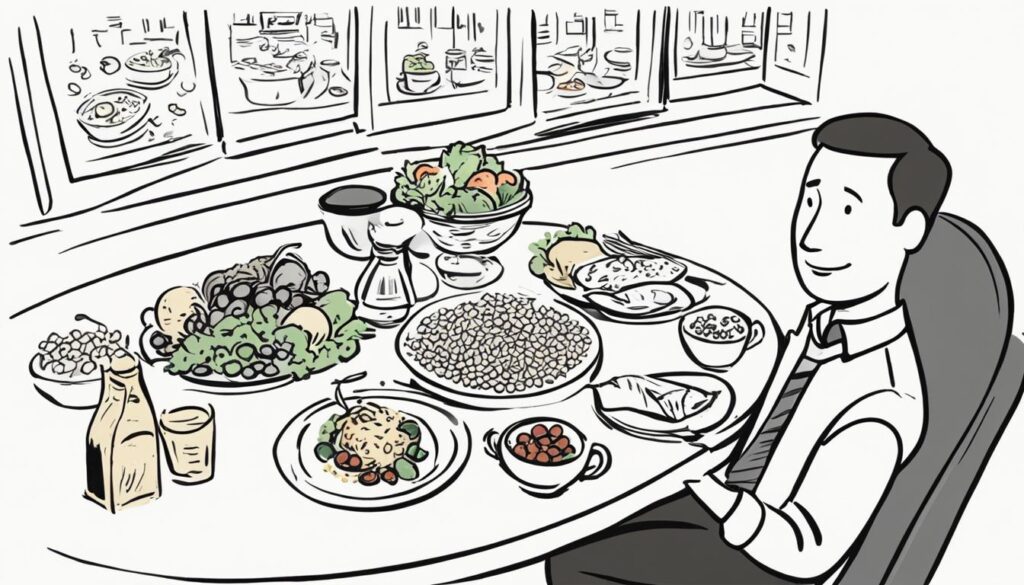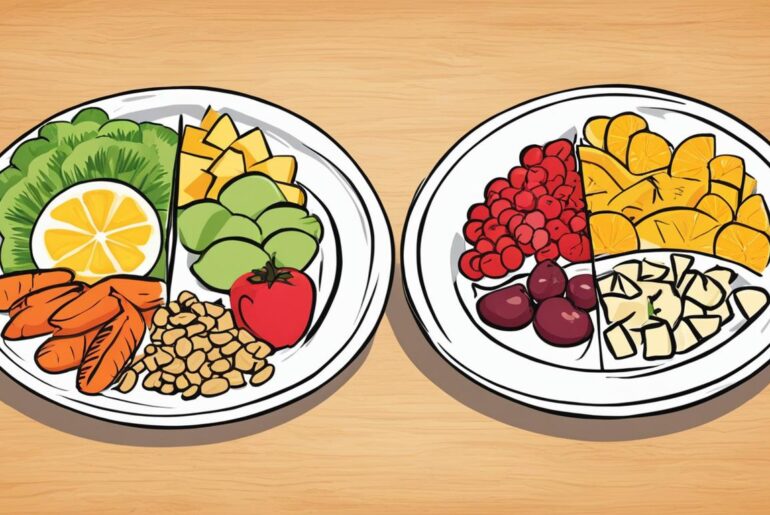When it comes to losing weight and maintaining a healthy weight, adopting a balanced diet is key. However, with so much information available, it can be overwhelming to know where to start. In this article, I will provide you with expert tips on balanced diet strategies to help you achieve your weight loss goals. These tips are based on research and advice from multiple sources, and they cover various aspects of healthy eating, including portion control, nutrient-rich foods, and mindful eating practices. By incorporating these strategies into your lifestyle, you can create a sustainable and effective plan for weight loss and overall health.
Key Takeaways:
- Implement portion control and choose nutrient-rich foods to support weight loss.
- Increase fiber intake by including whole grains, fruits, vegetables, beans, nuts, and seeds in your diet.
- Reduce consumption of added sugars, as they can contribute to weight gain and health problems.
- Incorporate healthy fats, like those found in olive oil, avocados, nuts, and seeds, for satiety and reduced cravings.
- Practice mindful eating by slowing down, enjoying your food, and listening to hunger and fullness cues.
Fill up on Fiber for Weight Loss
One important strategy for weight loss is to increase your intake of fiber-rich foods. Research has shown that consuming more fiber can help with weight loss and weight management.
Incorporating a variety of fiber-rich foods into your diet is essential for healthy eating and a high-fiber diet. Whole grains, such as whole wheat bread, brown rice, and oats, are excellent sources of fiber. Additionally, beans, fruits, vegetables, nuts, and seeds are all rich in fiber.
Fiber-rich foods not only provide essential nutrients but also help keep you feeling full and satisfied, reducing the chances of overeating. They take longer to digest, which means they can help control your appetite and contribute to weight loss.
Here are some examples of fiber-rich foods:
| Fiber-Rich Foods | Fiber Content (per serving) |
|---|---|
| Whole wheat bread | 3 grams |
| Brown rice | 3.5 grams |
| Oats | 4 grams |
| Black beans (cooked) | 8 grams |
| Raspberries | 8 grams |
| Broccoli | 5 grams |
| Almonds | 3.5 grams |
| Chia seeds | 10 grams |
These are just a few examples, and there are many other fiber-rich foods to choose from. By including a variety of these foods in your meals and snacks, you can easily increase your fiber intake and support your weight loss goals.
Remember to drink plenty of water when consuming a high-fiber diet to promote digestion and overall well-being.
Cut Back on Added Sugar for Healthy Weight Loss

Reducing your consumption of added sugars is a crucial strategy for achieving healthy weight loss. Foods and drinks that are high in added sugars can contribute to unhealthy weight gain and lead to various health problems, including diabetes and heart disease.
It's important to be mindful of the sugar content in the foods you consume, even those marketed as “healthy” or “organic.” Taking the time to read nutrition labels can help you make informed choices about your sugar intake.
Foods that are commonly high in added sugars include candy, soda, and baked goods. By cutting back on these sugary treats, you can effectively reduce your calorie intake and support your weight loss goals.
When it comes to choosing healthier alternatives, opt for whole foods that are naturally sweet, such as fruits. Not only do they provide essential vitamins and minerals, but they also contain fiber, which can help you feel fuller for longer.
Benefits of Reducing Added Sugar Intake:
- Supports healthy weight loss
- Reduces the risk of weight-related health problems
- Promotes better overall health and well-being
By making conscious choices to cut back on added sugars and incorporating healthier alternatives, you can take significant steps towards achieving your weight loss goals and improving your overall health.
Remember, healthy eating is a key component of any successful weight loss journey. Stay committed to making nutritious food choices and prioritize your well-being.
| Foods and Drinks High in Added Sugars | Healthier Alternatives |
|---|---|
| Soda | Infused water |
| Candy | Fresh fruit |
| Baked goods | Homemade treats sweetened with natural alternatives like honey or maple syrup |
Make the choice to cut back on added sugars and prioritize your health. Your body will thank you!
Include Healthy Fats in Your Diet for Weight Loss
Contrary to popular belief, including healthy fats in your diet can actually support weight loss. Healthy fats, such as those found in olive oil, avocados, nuts, and seeds, provide essential nutrients and help you feel fuller for longer.
Research has shown that following a high-fat diet that includes these healthy fats can maximize weight loss results. By incorporating these foods into your meals and snacks, you can enjoy the benefits of healthy fats while working towards your weight loss goals.
Here are some examples of healthy fats that you can incorporate into your diet:
| Food | Healthy Fat Content |
|---|---|
| Olive oil | 14g of monounsaturated fats per tablespoon |
| Avocado | 15g of healthy fats per medium-sized fruit |
| Nuts (almonds, walnuts) | Average of 14g of healthy fats per ounce |
| Seeds (chia seeds, flaxseeds) | Average of 9g of healthy fats per ounce |
By including these foods in your diet, you can add flavor and texture to your meals while increasing satiety and reducing cravings. Remember to practice portion control and incorporate them into a balanced eating plan.
Next, I will discuss the importance of practicing mindful eating for weight loss success.
Practice Mindful Eating for Weight Loss Success

Mindful eating is a powerful strategy for weight loss and creating a balanced relationship with food. By slowing down and savoring each bite, you can cultivate a deeper connection with your meals and improve your overall well-being. Mindful eating involves listening to your body's hunger and fullness cues, which can help reduce overeating and promote healthy food choices.
When you practice mindful eating, you engage all your senses and fully enjoy the eating experience. Take the time to notice the colors, smells, flavors, and textures of the food on your plate. By doing so, you can enhance your satisfaction and appreciate the nourishment that each meal provides.
Here are some practical tips to incorporate mindful eating into your daily routine:
- Slow down: Take your time to eat and chew each bite thoroughly. This allows your body to process and absorb the nutrients effectively, while also giving your brain enough time to register feelings of satisfaction.
- Enjoy each bite: Pay attention to the taste and texture of the food in your mouth. Fully savor each bite, allowing yourself to truly enjoy the flavors and sensations.
- Listen to your hunger cues: Before eating, check in with your body to assess your level of hunger. Eat when you are truly hungry and stop when you start to feel comfortably full.
- Minimize distractions: Avoid eating while watching TV, using electronic devices, or engaging in other activities. By focusing solely on your meal, you can be more present and attuned to your body's needs.
- Be non-judgmental: Practice self-compassion and avoid labeling foods as “good” or “bad.” Instead, adopt an open-minded and non-judgmental approach towards your eating habits.
“The best way to capture moments is to pay attention. This is how we cultivate mindfulness.” – Jon Kabat-Zinn
Incorporating mindful eating practices into your daily routine can support your weight loss journey and help you maintain a healthy weight in the long term. By slowing down, enjoying your food, and listening to your body's hunger and fullness cues, you can reduce overeating and make healthier choices.
| Benefits of Mindful Eating | Effects of Mindless Eating |
|---|---|
| ✔ Improved digestion | ✘ Digestive discomfort |
| ✔ Enhanced satisfaction from meals | ✘ Feeling unsatisfied after eating |
| ✔ Better portion control | ✘ Overeating and weight gain |
| ✔ Increased awareness of hunger and fullness cues | ✘ Ignoring body's signals |
| ✔ Reduced emotional eating | ✘ Eating in response to emotions |
Stay Hydrated and Make Smart Beverage Choices

Proper hydration is essential for overall health and can also support weight loss efforts. Drinking enough water throughout the day helps keep your body functioning optimally and can even aid in weight management.
Research has shown that people who drink water before meals consume fewer calories and have better appetite control. Staying hydrated by drinking water can help you feel full and satisfied, reducing the urge to overeat or snack on unhealthy foods.
On the other hand, sugary drinks like soda and sports beverages can be high in calories and contribute to weight gain. These drinks not only add empty calories to your diet but also lack nutritional value.
By making smart beverage choices, such as opting for water or other low-calorie options, you can effectively manage your calorie intake and support your weight loss goals.
| Beverage Options | Calories per Serving | Benefits |
|---|---|---|
| Water | 0 | Hydrating, calorie-free |
| Herbal Tea | 0 | Natural flavors, hydrating |
| Sparkling Water | 0 | Refreshing, carbonated alternative to soda |
| Fruit Infused Water | 0 | Natural flavors, hydrating |
| Non-Fat Milk | 83 | Calcium, protein |
These healthy beverage options not only quench your thirst but also provide additional benefits such as hydration, natural flavors, and essential nutrients. By choosing these alternatives over sugary drinks, you can reduce your calorie intake and make progress towards your weight loss goals.
Conclusion
Achieving and maintaining a healthy weight requires adopting balanced diet strategies that are sustainable and effective. By incorporating tips such as increasing fiber intake, cutting back on added sugars, including healthy fats, practicing mindful eating, staying hydrated, and making smart beverage choices, you can create a healthier lifestyle that supports weight loss and overall well-being.
Remember, weight loss is a journey, and the key is to find a balance that works for you. By implementing these strategies and making gradual changes to your eating habits, you can achieve long-term success in reaching your weight loss goals. Stay committed, stay focused, and prioritize your health and well-being.
By following these effective weight loss tips and adopting healthy eating habits, you can manage your weight and improve your overall health. Remember to consult with a healthcare professional or a registered dietitian to personalize your weight loss plan according to your individual needs and goals. With dedication, consistency, and a balanced approach, you can achieve sustainable weight loss and enjoy a healthier lifestyle.




